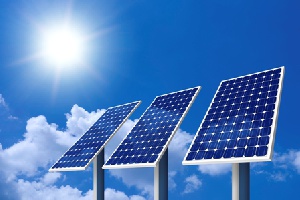Business News of Monday, 18 November 2013
Source: B&FT
Africa needs US$100bn solar power investment
…over the next decade
Africa needs to invest about US$100billion in solar power over the next decade if it is to wean itself from sources of energy which are widely regarded as unsustainable, Terje Pilskog, an expert in solar power generation, has said.
“These are enormous investments we are talking about for the next 10 years. We are talking about close to US$100billion in investment needs to meet the target in Africa. In order to make this happen, you will need to mobilise the private sector,” he added.
Mr. Pilskog, who is the Chief Operating Officer of Scatec Solar, a Norwegian energy company that constructed the continent’s largest solar plant in South Africa, was speaking to the B&FT on the sidelines of a meeting between Scatec Solar and stakeholders in the energy sector on lessons that can be drawn from its operations in South Africa.
Energy experts believe that by investing in the long-term energy solutions that alternative energy sources afford, most African nations would benefit significantly in the longer-term by avoiding energy problems most developed countries are facing.
Norwegian Ambassador to Ghana Hege Hertzberg, speaking at the event, said Africa must exploit other sources of energy in order to drive its industrial expansion.
“Solar is the solution to so many challenges. The raw material is here, and it will last longer than oil and gas. The monthly average solar irradiation in Ghana, for instance, is between 4.4 and 5.6kWh/m2/day, with sunshine duration between 1,800 and 3,000 hours per annum,” she said.
The challenge of solar energy, she however said, has always been the initial cost. “But prices -- the panels, the batteries as well as other storage facilities -- are going down. The running costs thereafter are relatively small. In order to really get the investment costs down, the technology must become more mainstream and the competition higher,” she added.
Sub-Saharan Africa alone needs more than US$300billion to achieve universal access to electricity by 2030, according to the International Energy Agency, a body that advises members of the Organisation for Economic Cooperation and Development (OECD) on energy policy.
Although Africa is rich in oil, gas, coal and renewable energy resources, electricity is hard to come by -- which traps people in poverty. The World Bank says only 29% of sub-Saharan Africa's population has access to power. Furthermore, African manufacturing companies experience power outages 56 days per year on average.
The United States early this month pledged a US$7billion investment over the next five years in its “Power Africa” initiative aimed at solving some of the continent’s energy problems. According to President Barack Obama who announced the initiative, another US$9billion is expected to come from the private sector -- initially targetting six countries: Ethiopia, Ghana, Kenya, Liberia, Nigeria and Tanzania.











